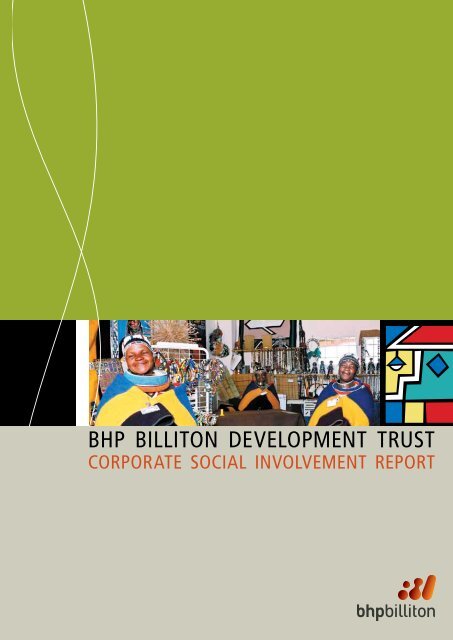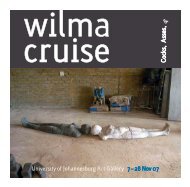BHP BILLITON DEVELOPMENT TRUST - ELLEN PAPCIAK-ROSE
BHP BILLITON DEVELOPMENT TRUST - ELLEN PAPCIAK-ROSE
BHP BILLITON DEVELOPMENT TRUST - ELLEN PAPCIAK-ROSE
Create successful ePaper yourself
Turn your PDF publications into a flip-book with our unique Google optimized e-Paper software.
<strong>BHP</strong> <strong>BILLITON</strong> <strong>DEVELOPMENT</strong> <strong>TRUST</strong><br />
CORPORATE SOCIAL INVOLVEMENT REPORT
A capacity building permaculture farming<br />
project for rural Mpumalanga women, a<br />
partnership with Technikon Pretoria<br />
MISSION<br />
The <strong>BHP</strong> Billiton Development Trust (BBDT) implements sustainable community development<br />
projects to make sure that <strong>BHP</strong> Billiton (and its associate companies and operations) is a<br />
preferred business partner and a corporate citizen valued by all stakeholders.<br />
“...we are earning acceptance and legitimacy in our local communities...”
CONTENTS<br />
<strong>BHP</strong> Billiton Development Trust (BBDT) - An Overview.....2<br />
The People of the BBDT.....3<br />
Education Initiatives.....6<br />
Government Initiatives.....8<br />
HIV & AIDS.....10<br />
Job Creation.....12<br />
Victim Empowerment.....15<br />
Tertiary Education Initiatives.....16<br />
Financial Summary.....18<br />
Contacts.....20<br />
A craftswoman at the Little Elephant / Indlovu Encane Project<br />
1
<strong>BHP</strong> <strong>BILLITON</strong> <strong>DEVELOPMENT</strong><br />
<strong>TRUST</strong> (BBDT) - AN OVERVIEW<br />
In supporting socio-economic development in South Africa, the <strong>BHP</strong> Billiton<br />
Development Trust (BBDT) implements, co-ordinates and manages the sustainable<br />
development initiatives of <strong>BHP</strong> Billiton and <strong>BHP</strong> Billiton companies and operations<br />
such as Samancor Chrome, Samancor Manganese, Ingwe Collieries Limited and <strong>BHP</strong><br />
Billiton Aluminium, which participate in the Trust.<br />
The Trust is overseen by a board of trustees, which approves the strategic direction<br />
and policies of the BBDT in consultation with the Trust’s management team, whose<br />
members are responsible for the execution of policy, strategy and management of the<br />
day-to-day administration of the Trust’s affairs. The BBDT management consists of<br />
representatives from the <strong>BHP</strong> Billiton companies.<br />
“The strategy of the BBDT is to focus on specific areas of prevailing concern<br />
in South Africa today, where we believe we can make a tangible difference<br />
Mike Salamon, the BBDT chairperson<br />
through community development. These include health, sustainable job creation,<br />
empowerment through skills development, capacity building and educational<br />
upliftment,” says the BBDT chairperson Mike Salamon.<br />
“The BBDT does this through sustained partnerships, joint ventures, the establishment of mutually beneficial relationships with<br />
key stakeholders, such as the government and early involvement of the communities relevant to various projects. As a result of this<br />
approach, we are earning acceptance and legitimacy in local communities.<br />
While the BBDT’s focus is on key themes with which <strong>BHP</strong> Billiton can identify, we have found that there is enough opportunity for<br />
flexibility to work in other appropriate areas,” adds Salamon.<br />
THE BBDT FUNDING CRITERIA<br />
The projects, which emerge from various quarters, must meet the BBDT’s funding requirements before assistance is given.<br />
A holistic and integrated approach is followed that focuses on initiatives that:<br />
1. Create capacity in an organisation, community or government department to ensure the benefit of our contribution continues after<br />
our support is given.<br />
2. Become self-sustainable as soon as possible. They should have clear plans in place, with a sunset clause, so that the BBDT can<br />
move away from a project after it has become self-sustainable. Support is also given to pilot projects which can be replicated by<br />
government or other stakeholders.<br />
The BBDT endeavours to form partnerships with other stakeholders to maximise impact and leverage government funding and to use<br />
other available resources. Relevant stakeholders in this regard include all levels of government, Non Governmental Organisations<br />
(NGOs), private sector partners, communities and <strong>BHP</strong> Billiton employees and representatives.<br />
Funding of initiatives at tertiary education institutions is an important part of the BBDT’s activities. Generally, the objective is to<br />
support fewer institutions, in a substantial way. This support spans a number of years, if necessary.<br />
Some of the more specific criteria for funding are listed below:<br />
• Support is given to programmes aimed at advancing socio-economic development<br />
• Research projects that benefit the mining industry and community in general<br />
• Improvement of teaching levels of mathematics, science, English and technology<br />
• Projects aimed at the improvement/facilitation of academic performance<br />
• Projects that deal with transformation of tertiary institutions<br />
This publication is evidence of the successful application of the approach, principles and activities of the BBDT, according to four<br />
broad areas - education and training, capacity building, socio-economic development and health care.<br />
2
THE PEOPLE OF THE BBDT<br />
The BBDT is comprised of a dedicated management team who strive towards achieving the<br />
objectives of the Trust through the inception, management and implementation of the various<br />
projects and activities highlighted in this publication. They are supported by a team of seven<br />
administrators.<br />
SAM SEEPEI<br />
Sam Seepei, senior manager of the BBDT, heads up the Trust and is therefore<br />
accountable for reporting back to both <strong>BHP</strong> Billiton management and stakeholders on<br />
the Trust’s activities. He is responsible for the strategic direction of the department,<br />
financial control, producing the annual business plan and ensuring there is delivery<br />
on the business plan.<br />
Sam joined <strong>BHP</strong> Billiton in January 1985 as a personnel clerk. He has held a<br />
number of positions at the company in its various guises, including industrial relations<br />
officer and manager of the Samancor Foundation.<br />
He is also tasked with relationship building with stakeholders of interest, as well<br />
as partnering with relevant parties in other organisations and the government.<br />
GERALD MASHININI<br />
Gerald Mashinini, manager of finance and administration at the BBDT, started his<br />
working life with <strong>BHP</strong> Billiton in 1980 as a student trainee. He joined the company in a<br />
permanent capacity in December 1981. Gerald’s responsibilities include control of the<br />
Trust’s budget, compliance with corporate governance issues and the production of<br />
monthly financial statements.<br />
During his career at <strong>BHP</strong> Billiton, he has been a creditors clerk, a sub accountant,<br />
a financial accountant and then group accountant. He then moved to the company’s<br />
manganese division, where he held the position of management accountant,<br />
following which he was appointed to his current post at the BBDT.<br />
He was a trustee of the Samancor Group Provident Fund and is a director of the<br />
Kotulong Community Centre in Meyerton.<br />
3
LULU KHUMALO<br />
Lulu Khumalo, manager of communication and education for the BBDT, joined the<br />
company in April 2002. Her responsibilities include communicating the projects of the<br />
BBDT to stakeholders and other interested parties, as well as managing the education<br />
portfolio for the Trust.<br />
Prior to joining the BBDT, Lulu was chief executive officer of the Arts & Culture<br />
Trust, a private sector initiative to fund the arts.<br />
Among her challenges, Khumalo lists the implementation of a R30 million, 29-<br />
school holistic whole school development programme that will create centres of<br />
excellence out of all these schools.<br />
LESELA (PATRICK) MABELANE<br />
Lesela Mabelane joined <strong>BHP</strong> Billiton SA in September 1999 as manager of the<br />
Samancor Foundation, part of the BBDT. His duties include co-ordination of the<br />
company’s Corporate Social Involvement (CSI) activities with Samancor business<br />
units, forging and maintaining public private partnerships (PPPs) at provincial and<br />
local government level, ensuring compliance with recommended project management<br />
procedures, budgeting for CSI, preparing monthly reports on strategic projects and<br />
preparing and compiling quarterly reports for both the BBDT and the Samancor<br />
Foundation trustee board meetings.<br />
Lesela is a trustee of the Samancor Foundation and the Education Development<br />
Trusts of the Mpumalanga, Northern Cape, Limpopo and North West provinces. He is<br />
also a director of the Green Village Housing Association and an associate member of<br />
the Association of Mine Financial and Administrative Managers.<br />
BONGANI MQAISE<br />
Bongani Mqaise joined the BBDT in March 2002 as manager, CSI, <strong>BHP</strong> Billiton<br />
Aluminium SA. His responsibilities include ensuring that the CSI programmes<br />
implemented by the company’s Hillside and Bayside Smelters in Richards Bay align<br />
with the CSI strategy of the BBDT. These must, in turn, be in line with the company’s<br />
Health, Safety, Environment & Community (HSEC) Charter and management ethos.<br />
He is the local chairperson of the Black Management Forum (BMF). Bongani’s<br />
community projects have won two presidential awards and <strong>BHP</strong> Billiton’s global HSEC<br />
awards. He is also a director and trustee of four organisations.<br />
4
CHRISTIAN PETER<br />
Christian Peter is the CSI manager for Ingwe Collieries Limited, part of <strong>BHP</strong> Billiton<br />
and was appointed to his current position in 1997. His responsibilities include<br />
analysing, monitoring and ensuring projects are implemented in line with the BBDT<br />
initiatives; building and maintaining relationships with government departments,<br />
NGOs and small business development.<br />
He works closely with local economic development forums in the areas in which<br />
Ingwe operates. He is also a member of the Black Management Forum (BMF), the<br />
South African Board for Personnel Practice (SABPP) and the Institute for People<br />
Management (IPM).<br />
PHANUEL RAMALIWA<br />
Phanuel Ramaliwa, project administration officer for the BBDT, began his working life<br />
with the Trust as a trainee project manager in 1998. In 2000 he was appointed to a<br />
permanent position. His responsibilities entail the monitoring of the implementation<br />
of all CSI projects being undertaken by the BBDT, in conjunction with the managers<br />
responsible for the various divisions.<br />
NORAH SEGOATI<br />
Norah Segoati, health manager for the BBDT, develops health and social model<br />
programmes for the company and implements these in communities. She also<br />
develops, implements and monitors the BBDT’s HIV & AIDS policy.<br />
Norah joined the Trust in May 2002. She was previously the deputy director for<br />
youth and adolescent health at the National Department of Health.<br />
Norah’s duties include liaising with relevant stakeholders and forming<br />
partnerships with them to implement health programmes. She also liaises with<br />
international NGOs to forge partnerships with them for the designed programmes.<br />
5
EDUCATION INITIATIVES<br />
GRANTLEY COLLEGE<br />
Every learner deserves the chance to succeed, to fly! Grantley College, a small private school in Parktown, was established in 1964 to<br />
create a structured, caring and creative environment for children with learning disabilities.<br />
When writing standardised tests that assess reading, writing and mathematics skills, these children perform substantially below<br />
the level expected of their age and intellectual ability. Through entrance tests and psycho-educational assessments, the college<br />
establishes which kind of interventions are needed for their further education.<br />
Grantley College offers a fully remedial grade 7 and assisted education in grades 8 and 9. It also runs two very successful careeroriented<br />
National Senior Certificate courses: Food Services and Art and Design. The courses last for two years, and are the equivalent<br />
of a Standard Grade Matric, allowing learners to proceed to a technikon to pursue a tertiary education. More academically inclined<br />
learners write a Gauteng Department of Education (GDE) Matric. In the past few years, the college has consistently achieved a 100%<br />
pass rate.<br />
Independent schools no longer qualify for financial assistance if the fees exceed R10 000 a year. This has serious consequences<br />
for schools such as Grantley College, where the caring, assisted education programme has a learner/educator ratio of 10:1.<br />
Inevitably, fees are high - currently they stand at just under R30 000 per learner per year.<br />
Since this makes the educational service offered unaffordable to learners from disadvantaged communities, it is vital that<br />
assisted funding bursaries be made available. To this end, the BBDT has made a grant of R100 000 available.<br />
INGWE SATURDAY SCHOOL PROJECT<br />
The Ingwe Saturday School Project, which provides tuition in Mathematics, Physical Science, English and Accountancy, began with<br />
750 learners in 2001. The Project was initiated by Ingwe Collieries Limited, and initially was housed in the Ingwe Learning Centre. It<br />
was so popular, though, that the number of learners increased tremendously, which necessitated its relocation to Allendale College.<br />
At this venue, the Project has attracted learners from as far afield as the Carolina and Belfast districts.<br />
The classes are handled by senior markers in Mpumalanga, who know exactly how to prepare learners for examinations. This is<br />
reflected by a 12% improvement in the pass rate of the subjects taught.<br />
A number of educators in the province are also attending the Saturday classes, to assist them to prepare learners at their own<br />
schools for examinations. A number of requests have been received from other regions in Mpumalanga to replicate the Project and<br />
this is being considered.<br />
HOSTEL AT DEBEN<br />
The first day of August 2002 was a special day for the learners of the Northern Cape town of Deben. This was the day on which their<br />
brand new, R7 million hostel was opened by former president Nelson Mandela. The building challenge was taken up by <strong>BHP</strong> Billiton in<br />
partnership with Kumba Resources (previously part of Iscor). A third partner, the Northern Cape Department of Education, provided<br />
the necessary equipment and furniture and will maintain the 320-bed hostel.<br />
Deben, about 40km southwest of Kathu, has the largest primary school in the district. Children from the far-flung farming<br />
community around this town were under great pressure. Until the hostel was built, they could either travel vast distances to and from<br />
school, or they could lodge under poor conditions in private homes in Deben.<br />
Work at the hostel was done through the Northern Cape Education Development Trust, an initiative of concerned corporations<br />
wanting to assist government in addressing the backlog in education.<br />
The BBDT sees education in its broader sense of community development addressing social problems. In this way a world view of<br />
caring and accountability is inculcated in our youth.<br />
6
E-LEARNING CENTRES<br />
The BBDT’s R750 000 investment in<br />
three e-learning centres provided a<br />
welcome boost to the underdeveloped<br />
communities of Sharpeville, Kagiso and<br />
Steelpoort.<br />
Facilities at the centres include video machines and computers with CD-ROMs. Students can make use of these facilities to<br />
develop their communications skills, life skills, HIV & AIDS awareness and environmental knowledge. They can also access online<br />
training for the International Computer Driving Licence (ICDL).<br />
The Sharpeville and Kagiso e-learning centres form part of the municipal libraries while the Steelpoort e-learning centre is set<br />
up at the Winterveld Mine Training Centre outside Steelpoort. Students and learners from surrounding communities have been<br />
benefiting from these resources.<br />
FREDDY MOKGABUDI<br />
SCHOOL PROJECT<br />
The learners of Freddy Mokgabudi<br />
School at Jane Furse in Limpopo were<br />
once taught in shacks, with no ablution<br />
facilities. All that has changed since<br />
the school received a cash injection of<br />
R600 000 from the BBDT and R400 000<br />
provided by the Samancor Foundation for<br />
the construction of eight new classrooms,<br />
fencing and water storage facilities. A<br />
committed labour force drawn from the<br />
local community was responsible for the<br />
construction work.<br />
The BBDT was instrumental in the<br />
establishment of Education Development<br />
Trusts in seven of South Africa’s nine<br />
provinces. The Freddy Mokgabudi School<br />
Project is another example of the delivery<br />
of one of the provincial Education<br />
Development Trusts, through which it<br />
was implemented.<br />
These Trusts have succeeded in mobilising resources by forging partnerships with private sector stakeholders. The Education<br />
Development Trusts are models that can be replicated by other government departments.<br />
7
GOVERNMENT INITIATIVES<br />
TECHNOLOGY FOR WOMEN IN BUSINESS (TWIB)<br />
TWIB is a national programme that facilitates access to and recognition for women in science and technology. In 2002, the BBDT<br />
sponsored the TWIB conference in Durban.<br />
The conference targets existing and aspiring businesswomen in order to accelerate business growth through partnerships,<br />
education, training and mentoring. The strategic objectives of the TWIB programme are to:<br />
• Provide women-owned Small Medium Micro Enterprises (SMMEs) with access to a science and technology support base to help<br />
them become innovative, effective and profitable<br />
• Encourage and influence young women and girls to choose careers in science and technology<br />
• Give recognition to institutions that support women in business<br />
• Promote cooperation between SMMEs, large businesses, parastatals and science councils<br />
• Promote public and private sector support to SMMEs owned and/or led by women<br />
The project is in line with <strong>BHP</strong> Billiton’s Health, Safety, Environment and Community (HSEC) management standards in that it is aimed<br />
at capacity building for women, particularly black women, who were previously marginalised. This project helps to bring women into<br />
full participation in the mainstream economy and, since science and technology are the backbone of all <strong>BHP</strong> Billiton operations, this<br />
project, through its strategic objectives of influencing women to pursue studies and careers in science and technology, also helps to<br />
expand the future skills base for the company.<br />
TWIB is championed by the honourable ministers Phumzile Mlambo-Ngcuka, of the Department of Minerals and Energy (DME), and<br />
Lindiwe Hendricks of the Department of Trade and Industry (DTI). Women of the Ministers’ Forum are also patrons of the TWIB projects.<br />
WSSD ESSAY AND ART CHALLENGE<br />
Art competition winner, Jade Changepar<br />
As part of a multi-faceted R500 000 campaign in the education sector<br />
to ensure that the World Summit on Sustainable Development (WSSD)<br />
would have a lasting impact on young people’s lives, the Department<br />
of Environmental Affairs and Tourism, with support from the BBDT,<br />
conducted an exciting art and essay challenge on a national scale.<br />
The aim of the campaign was not only to create awareness about the<br />
summit, but also to galvanise participation from learners, educators and<br />
parents.<br />
The essay challenge targeted grade 9 learners, and was called How<br />
Does My Career Contribute to Sustainable Development? The winner<br />
of the first prize, Mfundo Malangeni, is a learner at the Centre for Science<br />
and Technology in Mitchells Plain. He received a R100 000 tertiary<br />
education bursary. The second and third prizes were R50 000 and R25 000<br />
respectively.<br />
In the art component of the competition, the nation’s 10-year-old<br />
learners were asked to present their visual interpretation of sustainable<br />
development in a challenge entitled The World Through My Eyes.<br />
10-year-olds were targeted because they were born at the time of the<br />
last World Summit, and their interpretations would go far in illustrating<br />
what the world has achieved in the last decade in educating people and<br />
what it has put in place for sustainable development to be realised. The<br />
prizes ranged from R5 000 to R15 000 and each winner’s school received<br />
a computer.<br />
8
THE URBAN GREENING FUND (UGF)<br />
In the past 12 years, Food & Trees for Africa (FTFA) has distributed over 1,5 million<br />
trees to disadvantaged communities in barren and degraded areas of the country.<br />
FTFA’s main activities are permaculture, urban greening and environmental awareness<br />
and education.<br />
The UGF was established in 2001, after FTFA asked the Department of Water and<br />
Forestry Affairs (DWAF) to respond to the increasing demand for help to “green”<br />
urban areas. DWAF made R1,2 million available to set up the UGF. In 2001, the BBDT<br />
contributed R100 000 to the fund.<br />
The UGF helps NGOs and Community Based Organisations (CBOs) in cross-sectoral<br />
partnerships to implement urban greening projects. It also undertakes research into<br />
the processes of urban greening.<br />
BBDT EMTHONJENI PERMACULTURE PROJECT<br />
The permaculture Project at Emthonjeni Youth Correctional Facilities in Baviaanspoort,<br />
outside Tshwane, should have long-term impact on the wellbeing and morale of the<br />
people in the prison.<br />
Before this Project was introduced, the diet at Emthonjeni was largely limited to<br />
pork and cabbage, resulting in malnutrition among inmates and staff. The prevalence<br />
of HIV & AIDS in prisons necessitates a good, nutritious diet that can boost the immune<br />
systems of HIV positive inmates as much as possible.<br />
After an appeal by Emthonjeni to the UGF, the R100 000 made available by the<br />
BBDT was utilised to start the Project to improve this situation and to provide skills<br />
training for the young inmates.<br />
The 30 participants were each allocated a piece of land on which to grow<br />
vegetables and fruit. They are also developing flower and herb beds and a mini park.<br />
In time they will showcase their permaculture model, as well as simple techniques of<br />
propagation and companion planting, as an appropriate technology to train others. The<br />
Project has been so successful that the prison has allocated more land to extend it, and<br />
the youths have created beds and contributed to the landscaping of the prison gardens.<br />
The Project has the potential to improve the diet and wellbeing at Emthonjeni,<br />
boost morale and create a sense of civic pride among the young inmates. The<br />
vegetables yielded by the Project are being sold, donated to HIV homes and used by the<br />
prison as part of a healthy diet. Through the Project, inmates learn new skills that they<br />
can apply once they have left the facility.<br />
This Project serves as an example that can be replicated to develop awareness<br />
among the entire prison community of the benefits of greening, food security and<br />
sustainable natural resource use.<br />
9
HIV<br />
&<br />
AIDS<br />
KHULISA PROGRAMME<br />
The Khulisa Programme has an extraordinary impact on all<br />
who participate in it.<br />
Khulisa, managed by the social entrepreneurial company Corrective Action Holdings,<br />
combines storytelling and life skills activities to restore self-respect and a sense of<br />
responsibility among young people at risk and in conflict with the law. Its ultimate aim<br />
is to foster crime reduction and prevention in this country.<br />
In 2000, the Munsieville Assertive Youth Group participated in a 13-week Khulisa<br />
Programme, facilitated by Dr Johann Broodryk, founder of the Ubuntu School of<br />
Philosophy.<br />
Phase ONE was aimed at boosting self-respect and social responsibility among<br />
participants. Phase TWO was an income-generating entrepreneurial training<br />
programme entitled Walking My Path. This was primarily a self-guided process with<br />
weekly facilitated group discussions. Two of the outcomes were the establishment of<br />
a community based website, and a youth co-operative to buy essential items direct<br />
from manufacturers at below cost price, for sale to members of the community. Other<br />
income-generating schemes were also initiated.<br />
Later on, the Programme was sponsored by the Department of Social Services to<br />
hold a goodwill campaign during which cultural programmes were taken to youth at<br />
risk and in conflict with the law, as well as to the frail and the aged.<br />
With R302 000 funding from the BBDT, 30 juvenile inmates participated in the<br />
first 12-month Khulisa Programme at Krugersdorp Juvenile Prison in 2001. The aim<br />
was to create a process of change, self-awareness and self-sustainability to facilitate<br />
participants’ reintegration into the community on their release.<br />
Several members of the Munsieville Assertive Youth Group were involved in this<br />
Programme. It included AIDS awareness training and a simulated business programme.<br />
An organic farming project, designed to provide prisoners with an opportunity to enter<br />
the labour market successfully on their release, was run in partnership with a local<br />
NGO.<br />
At the end of the Programme, participants became facilitators, each<br />
working with a group of five prisoners in the re-introduction of the Khulisa<br />
Programme the following year.<br />
After the remarkable success of the same Programme at Leeuwkop<br />
Prison, Corrective Action Holdings established a reintegration centre,<br />
dedicated to the rehabilitation and reintegration of young offenders. A<br />
chain of such facilities will eventually be created across the country.<br />
The philosophy of Khulisa is that the majority of juvenile offenders<br />
can only be taken out of criminal activity by rehabilitation combined with<br />
reintegration. Given the facilities, an estimated 80% success rate can be<br />
produced, compared with the system’s current 80% failure rate. Community<br />
support work involved will also contribute to poverty alleviation and therefore<br />
crime reduction.<br />
A Khulisa recruitment unit has been established, specifically for<br />
identifying income-generating opportunities for offenders, during and after<br />
their incarceration. This joint initiative by Corrective Action Holdings and<br />
a recruitment agency will provide a specialist service to facilitate the<br />
placement of ex-prisoners.<br />
10
KOTULONG<br />
COMMUNITY<br />
CENTRE PROJECT<br />
The Kotulong Project has<br />
seen the conversion of<br />
rudimentary, single-sex<br />
dormitories that once<br />
housed migrant workers<br />
into a vibrant community<br />
development centre.<br />
After restructuring at Metalloys (a<br />
division of Samancor Manganese<br />
which is part of <strong>BHP</strong> Billiton) in 2000,<br />
it was decided that an initiative to<br />
facilitate community empowerment<br />
and upliftment was needed.<br />
The community was mobilised to<br />
identify their needs, and a feasibility<br />
study was conducted. Government<br />
expressed the need to establish a<br />
development centre, due to high<br />
unemployment and the lack of skills<br />
within local communities.<br />
The conversion of the hostels into<br />
a multipurpose community centre<br />
started in earnest in February 2003.<br />
The aim of the Centre is to add quality<br />
to the lives of people who are povertystricken,<br />
unemployed, abused and<br />
affected and infected by HIV & AIDS,<br />
by providing support, encouragement<br />
and development opportunities.<br />
The facility, funded by the BBDT<br />
for just under R7 million, will include<br />
a hospice for terminally ill patients,<br />
residential units for orphans and<br />
vulnerable children, a central kitchen<br />
and dining/multipurpose hall, a<br />
resource library and administration<br />
and service facilities. There will also<br />
be sport and recreation areas and<br />
permaculture gardens.<br />
Different partners, including<br />
government and other stakeholders,<br />
visited the Centre while the<br />
conversion was taking place and were<br />
all excited with the model.<br />
11
JOB CREATION<br />
LITTLE ELEPHANT / INDLOVU<br />
ENCANE PROJECT<br />
The Little Elephant / Indlovu Encane Arts and Crafts Market<br />
near the Midway Inn in Middelburg, Mpumalanga, aims to<br />
create 300 or more job opportunities in the tourism sector.<br />
The market currently consists of 15 thatched stalls where<br />
entrepreneurs sell arts and crafts. Nine more stalls will be built<br />
when more funds become available.<br />
An Ndebele hut at the market is also used as a shop by<br />
entrepreneurs. Tsonga, Bapedi and Zulu huts will also be built<br />
in the future. The market also boasts a pottery studio and<br />
workshops. A sunken amphitheatre for cultural performances is<br />
being built.<br />
More than 160 crafters sell their crafts through the Project.<br />
Entrepreneurs form co-operatives, so that a number of peoples’<br />
work can be sold through each stall. A group of 10 cultural<br />
performers entertain visiting tourists.<br />
Beneficiaries of the Project receive extensive training<br />
in fields such as literacy, business skills, marketing and<br />
quality control and are also helped to make their businesses<br />
sustainable.<br />
To date, the Project has been funded primarily by<br />
Middelburg Ferrochrome, the Samancor Foundation and<br />
Ingwe Collieries Limited, all part of <strong>BHP</strong> Billiton, as well as<br />
the government’s Poverty Alleviation Programme through the<br />
Department of Arts and Culture.<br />
12
RIETSPRUIT SOCIAL PLAN<br />
Ingwe Collieries Limited has embarked on a social plan strategy<br />
for mining operations that are closing down due to depleted<br />
reserves. When operations at Rietspruit Mine Services ceased<br />
in 2002, all stakeholders collaborated to identify a number of<br />
projects to ensure continued economic activity.<br />
The Zisize Mini Farming Project was identified as one of<br />
the projects that will assist the Rietspruit community. This<br />
is a partnership between Ingwe, the Provincial Department<br />
of Agriculture, Emalahleni Local Municipal Council and the<br />
community.<br />
The Project has generated employment for 32 people<br />
on land donated by the mine. Cabbage, spinach, tomatoes,<br />
beetroot, onions, green peppers and lettuce are being grown.<br />
A market has been secured from a local chain supermarket,<br />
community shops and produce markets in the neighbouring<br />
towns.<br />
The success of the Project has generated some interest from<br />
the neighbouring farms, other mining houses and the Provincial<br />
Department of Agriculture, Conservation and Environment. The<br />
local minister of this department has visited the Project and<br />
was enthusiastic about its progress. A few more hectares have<br />
been donated to expand the Project, which will create further<br />
employment opportunities.<br />
Another initiative in the Rietspruit mining community is Sizana<br />
Beads and Baskets. Ingwe donated a total of R193 000 towards<br />
the Project, which saw 40 people trained in the manufacture of<br />
upmarket beadwork and wire baskets.<br />
CADET SCHEME<br />
Job creation is one of the most critical issues facing South Africa today. If we do not face up to the challenge of creating more jobs,<br />
the unemployment crisis in this country can only accelerate in the years to come.<br />
The BBDT Cadet Scheme was established in 1998 to assist the many young graduates who face unemployment due to lack of<br />
experience.<br />
Initially, graduates were only placed within <strong>BHP</strong> Billiton’s operating companies. Now, while they are still contracted to the BBDT,<br />
graduates are able to receive on-the-job experience with various other organisations that have joined the Scheme. They are free to<br />
leave the Scheme when they find alternative employment.<br />
Through participating in the Scheme, many disadvantaged people have found full-time employment. Future employers have<br />
the assurance that they will be appointing graduates who have acquired practical skills to cope with the day-to-day realities of the<br />
workplace.<br />
13
DOWNSTREAM ALUMINIUM PILOT<br />
PROJECT (DAPP)<br />
DAPP, a new, combined initiative of <strong>BHP</strong> Billiton Aluminium<br />
SA and the Zululand Chamber of Business Foundation (ZCBF),<br />
shows that downstream industries capable of manufacturing<br />
products that are currently imported, can be a reality in South<br />
Africa.<br />
Since Phase ONE of DAPP began in July 2002, the Project<br />
has grown into an operational production and training facility,<br />
where mould making, casting and fettling take place daily.<br />
Phase TWO will provide incubator facilities, where trainees<br />
from Phase ONE who show real entrepreneurship potential will<br />
be able to access equipment and resources as an important<br />
part of their growth towards independence.<br />
The ultimate intention is to establish a cluster of SMMEs,<br />
which will produce items for the local and international<br />
markets using primary aluminium. Participants will attend<br />
entrepreneurship training with a recognised training provider.<br />
A common foundry will service the clusters.<br />
16 participants commenced their training in November 2002. They were soon confidently casting and finishing products,<br />
complying with all relevant safety and production requirements. Their training has included practical and theoretical facets, as well<br />
as auxiliary activities such as aluminium welding, technical draughting, and the use of hand tools. Their business acumen has been<br />
upgraded through extensive training in life and business skills and entrepreneurship.<br />
Soon Phase TWO, which takes place in partnership with the DTI, will be under way. The DTI has committed R12,5 million to the<br />
Project over the next five years.<br />
Planning has commenced to equip the incubator and customise a building to be made available to the Project in<br />
April 2004. Some equipment has already been purchased and used extensively in the foundry.<br />
Apart from a contribution of R380 000 from the KwaZulu-Natal Department of Economic Affairs and<br />
Tourism, the R3 million establishment cost of Phase ONE were borne by <strong>BHP</strong> Billiton’s Bayside and Hillside<br />
Aluminium Smelters. In addition, company employees have provided extensive managerial input,<br />
technical assistance, risk assessment and advice in the design of the Project. <strong>BHP</strong> Billiton Aluminium SA<br />
representatives continue to serve as members of the Project steering and management committees.<br />
A major achievement to date is that trainees have themselves been adding value to the Project by<br />
producing marketable products, as intended. Not only does this constitute downstream beneficiation of<br />
Bayside and Hillside Aluminium Smelter’s primary product, but the sale of these products could ensure<br />
the income generation necessary for the long-term sustainability of the Project. The Project also has the<br />
exciting potential to tap into big international markets, having an impact on the flow of foreign capital into<br />
the country.<br />
Through the Council for Science Industries Research (CSIR), and with the assistance of <strong>BHP</strong> Billiton<br />
Aluminium SA, aluminium foundry equipment has been developed that can be commissioned using<br />
different forms of energy. This equipment is applicable specifically to rural situations. Three-phase,<br />
single-phase electricity or gas power can be used to drive a small furnace, sand mixer and<br />
buffing machine, which will enable a trainee to operate a small foundry from any premises.<br />
Under constant guidance and mentorship of the foundry, these operators will then become<br />
independent. The first of these rural facilities was launched in July 2003 in Nseleni, near<br />
Richards Bay.<br />
14
VICTIM EMPOWERMENT<br />
BEE COURTWISE PROGRAMME<br />
The BBDT, in partnership with the NGO, Bee<br />
Courtwise, is committed to an important initiative<br />
aimed at reversing the negative trends of violence<br />
against women and children in this country. The<br />
Programme aims to create at least 20 court preparation<br />
programmes housed in courts specialising in sexual offences.<br />
The Bee Courtwise Programme is funded by the BBDT and run in partnership with the Department of Social Development and the<br />
Department of Justice. It aims to contribute towards victim empowerment initiatives through training and capacity building, research<br />
and advocacy and to alleviate the effects of violence through the provision of trauma counselling and management to adult and child<br />
survivors.<br />
The Programme empowers survivors to tell their story when appearing in court, at the same time as gaining a clearer<br />
understanding of procedures within the court environment.<br />
Survivors participating in the Programme are less likely to suffer from post-traumatic stress disorder. Participation also prevents<br />
victims from themselves later becoming perpetrators in an ongoing cycle of abuse. Thanks to this Programme, there has also been a<br />
dramatic increase in successful prosecution rates over the past few years.<br />
All services are rendered free of charge. Various professionals such as social workers, prosecutors, health workers, police services<br />
personnel, pastoral workers and volunteers are all specially trained to prepare witnesses for court. The Programme runs on a monthly<br />
block-booking basis, which includes legal personnel, social workers and voluntary counsellors. It also caters for emergency court<br />
preparation on a daily basis.<br />
A specially developed kit, containing puppets and other useful materials, is used by the intermediary in the special courtroom<br />
while a child testifies. The kit is a facilitating tool to identify a child’s cognitive, social, emotional, memory and credibility skills.<br />
This is vital to ensure that the child testifies in such a way that the accused can be prosecuted. Use of the kit also reduces secondary<br />
trauma by making the criminal justice system more accessible and less threatening.<br />
The Programme also has an outreach aspect, so that child survivors are more easily integrated back into their families and society<br />
at large.<br />
Another significant aspect of the Programme is the juvenile diversion programme, run at schools and government institutions.<br />
Children between nine and 14 years of age are sent to participate in camp diversion programmes where conflict resolution and teambuilding<br />
are fostered. A specialised camp for abused children is run once a year, with the aim of providing counselling, restoring<br />
participants’ trust and dignity and rebuilding their self-esteem.<br />
A peer education shuttle programme that takes place in schools and communities is used to educate children about prevention of<br />
child sexual abuse, HIV & AIDS and teenage pregnancy.<br />
Notably, the Bee Courtwise Programme<br />
won an award in <strong>BHP</strong> Billiton’s HSEC awards,<br />
an internal programme recognising projects<br />
throughout <strong>BHP</strong> Billiton’s international<br />
concerns, which make a difference in the<br />
community.<br />
15
TERTIARY EDUCATION<br />
INITIATIVES<br />
PROJECT TO ESTABLISH THE<br />
NATIONAL INSTITUTE FOR HIGHER<br />
EDUCATION (NIHE) - NORTHERN CAPE<br />
The establishment of the NIHE in Kimberley is evidence that<br />
private-public sector partnerships can bring about socioeconomic<br />
change, economic empowerment and social<br />
transformation in South Africa.<br />
The partnership between the BBDT and the Northern<br />
Cape government culminated in the establishment of the first<br />
university in post-apartheid South Africa, realised via the BBDT’s<br />
donation of R8 million to the Project.<br />
The NIHE was initiated at a time when the Minister of<br />
Education, Kader Asmal, was calling for the consolidation of<br />
universities around the country. Although the province has had<br />
the best matric exam results in the country for the past two<br />
years, matriculants could not study further in their own region<br />
due to a lack of tertiary institutions in the Northern Cape. A<br />
Premier’s Bursary Fund offered scholars the opportunity to<br />
attend universities in other areas. These factors resulted in a<br />
“migrant student” problem. Once people had left the province<br />
and obtained skills, it was difficult to attract them back, leading<br />
John Raubenheimer, President and CEO of Samancor, Manganese<br />
to a brain drain.<br />
and Professor Kader Asmal, National Minister of Education<br />
Not only does this Project align the Northern Cape with<br />
the overall goals of government, but it also gives the province<br />
a head start in the race to develop similar private-public<br />
partnerships with other vital economic sectors.<br />
The BBDT played a leadership role in the establishment of competent and accountable management and governance structures,<br />
policies and systems that meet the legal requirements for higher education institutions.<br />
There are currently 900 students registered with the NIHE, fully funded by the BBDT. Although the NIHE is not yet registered as<br />
a full university, it has alliances with prominent universities throughout the country, which allow it to offer degree courses in a wide<br />
range of disciplines.<br />
The NIHE is also playing a leading role in the establishment of the Science Foundation at the Southern African Large Telescope<br />
(SALT) project in Sutherland, which will result in the largest single telescope in the Southern Hemisphere. This flagship project aims<br />
to demonstrate that the frontiers of science are not reserved only for the developed world.<br />
16
CIDA CITY CAMPUS<br />
In the 2002 budget speech, President Thabo Mbeki cited CIDA City<br />
Campus as one of the major initiatives effecting real transformation in<br />
South Africa. Over a four-year period, the BBDT is donating R4 million<br />
to CIDA to boost this vital process.<br />
CIDA City Campus is a non-profit higher education institution,<br />
providing free education to historically disadvantaged students.<br />
It is based in the old Investec building in central Johannesburg.<br />
By supporting the project, <strong>BHP</strong> Billiton puts its weight behind the<br />
campaign to regenerate the inner city.<br />
Of the 240 students who will benefit from the grant directly,<br />
120 will be drawn from the communities surrounding <strong>BHP</strong> Billiton’s<br />
operations, in support of the new Mveledzandivho programme,<br />
which develops schools near the company’s mines and works.<br />
CIDA City Campus offers one of the leading business degrees<br />
in South Africa. <strong>BHP</strong> Billiton’s involvement at CIDA will enhance the<br />
BBDT Cadet Scheme (read more about this under the Job Creation<br />
section), by providing a bigger pool of suitably educated candidates.<br />
It also means that <strong>BHP</strong> Billiton will be able to hand-pick employees<br />
from graduates that it has trained directly, who will be well qualified<br />
in appropriate areas including IT, finance, HR, leadership, operations<br />
management and marketing.<br />
A further bonus is that the CIDA project will directly benefit the community. Firstly, <strong>BHP</strong> Billiton will continue training<br />
entrepreneurs living in areas near its operations, to whom non-core services can be outsourced. Here, CIDA students can provide<br />
support through year-long mentoring programmes and specific products. Secondly, when CIDA students return home during<br />
the holidays, they will offer training in areas especially suited to the needs of their communities, such as HIV & AIDS awareness,<br />
sustainable development and entrepreneurship skills.<br />
SEDIBA PROJECT<br />
Lulu Khumalo, manager of communication and education for<br />
the BBDT and Professor JJA Smit, director of the Sediba Project<br />
Sediba is an innovative project aimed at upgrading the skills of<br />
historically disadvantaged maths and physical science educators<br />
in formal and informal educators’ training programmes. So<br />
far, about 120 000 learners in the North West province have<br />
benefited from their exposure to educators trained under<br />
Sediba.<br />
Sediba is based in the School of Science, Mathematics<br />
and Technology Education at Potchefstroom University. Since<br />
its inception in January 1996, the programmes have been<br />
successfully completed by 306 educators.<br />
The study programme runs part-time over two years. While<br />
training takes place in a high-tech environment, the courses<br />
equip educators to teach in schools where modern facilities are<br />
not available.<br />
In addition to this formal training, Sediba sends out a regular<br />
newsletter to schools and provides science and mathematics<br />
workshops for non-Sediba educators and subject advisors.<br />
Visits to the Sediba science garden, the computer centre and<br />
laboratories by science and mathematics learners are also<br />
arranged.<br />
Sediba is funded by the BBDT, in partnership with other<br />
businesses.<br />
17
FINANCIAL SUMMARY<br />
The <strong>BHP</strong> Billiton Development Trust (BBDT) implements, co-ordinates and manages the<br />
sustainable development initiatives of <strong>BHP</strong> Billiton and <strong>BHP</strong> Billiton companies and operations<br />
such as Samancor Chrome, Samancor Manganese, Ingwe Coal and <strong>BHP</strong> Billiton Aluminium,<br />
which participate in the Trust. <strong>BHP</strong> Billiton allocates 1% of pre-tax profits to corporate<br />
responsibility projects, based on a three-year rolling average. The actual expenditure on<br />
projects for the year ended June 2003 was R38.4 million and commitments amounted to an<br />
extra R31.6 million. Of this R24.1 million will be spent in the new financial year.<br />
Total expenditure by the BBDT on CSI projects for the year ended June 2003 amounted to R38.4 million and includes R1.7 million from<br />
the Samancor Foundation. The funds were applied on the four main expenditure themes, namely Education and Training, Capacity<br />
Building, Socio-Economic Development and Health Care. The allocation of funds is depicted on the graph below.<br />
18
Commitments on approved projects at the end of the year was R31.6 million of which R24.1 million will<br />
be spent in the new financial year. A comparison of expenditure by theme for the two financial years is<br />
shown below.<br />
19
CONTACTS<br />
<strong>BHP</strong> Billiton Development Trust<br />
Head Office<br />
Lulu Khumalo<br />
Telephone 011 376 2185<br />
Facsimile 011 376 2458<br />
Email lulu.khumalo@bhpbilliton.com<br />
<strong>BHP</strong> Billiton Aluminium SA CSI<br />
Bongani Mqaise<br />
Telephone 035 999 2090<br />
Facsimile 035 999 2710<br />
Email bongani.mqaise@bhpbilliton.com<br />
Ingwe Collieries Limited CSI<br />
Christian Peter<br />
Telephone 011 376 2122<br />
Facsimile 011 376 2458<br />
Email christian.peter@bhpbilliton.com<br />
Samancor Foundation<br />
Patrick Mabelane<br />
Telephone 011 376 3108<br />
Facsimile 011 376 2458<br />
Email patrick.mabelane@bhpbilliton.com<br />
Design & illustration: Ellen Papciak-Rose, Soweto Spaza cc, www.ellenpapciakrose.com<br />
Photography: Alex Daligand Photography, Telephone 011 442 8619<br />
Printing: Lebone Printers, Telephone 011 493 7921<br />
♻ Printed on recycled paper<br />
20
trust.bhpbilliton.com<br />
<strong>BHP</strong> Billiton Development Trust<br />
6th floor, 6 Hollard Street, Johannesburg, South Africa<br />
PO Box 61820, Marshalltown, 2107, South Africa<br />
Telephone +27 11 376 2185<br />
Facsimile +27 11 376 2458<br />
Email lulu.khumalo@bhpbilliton.com












